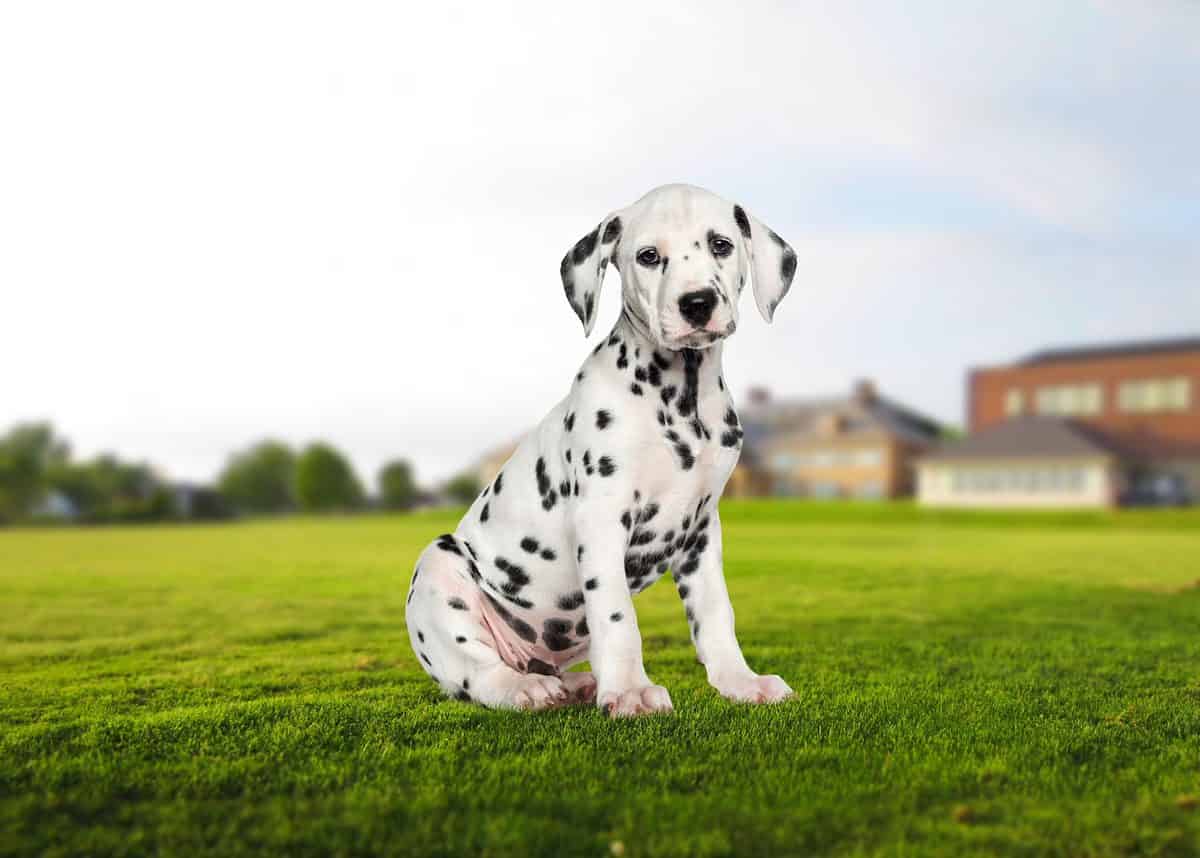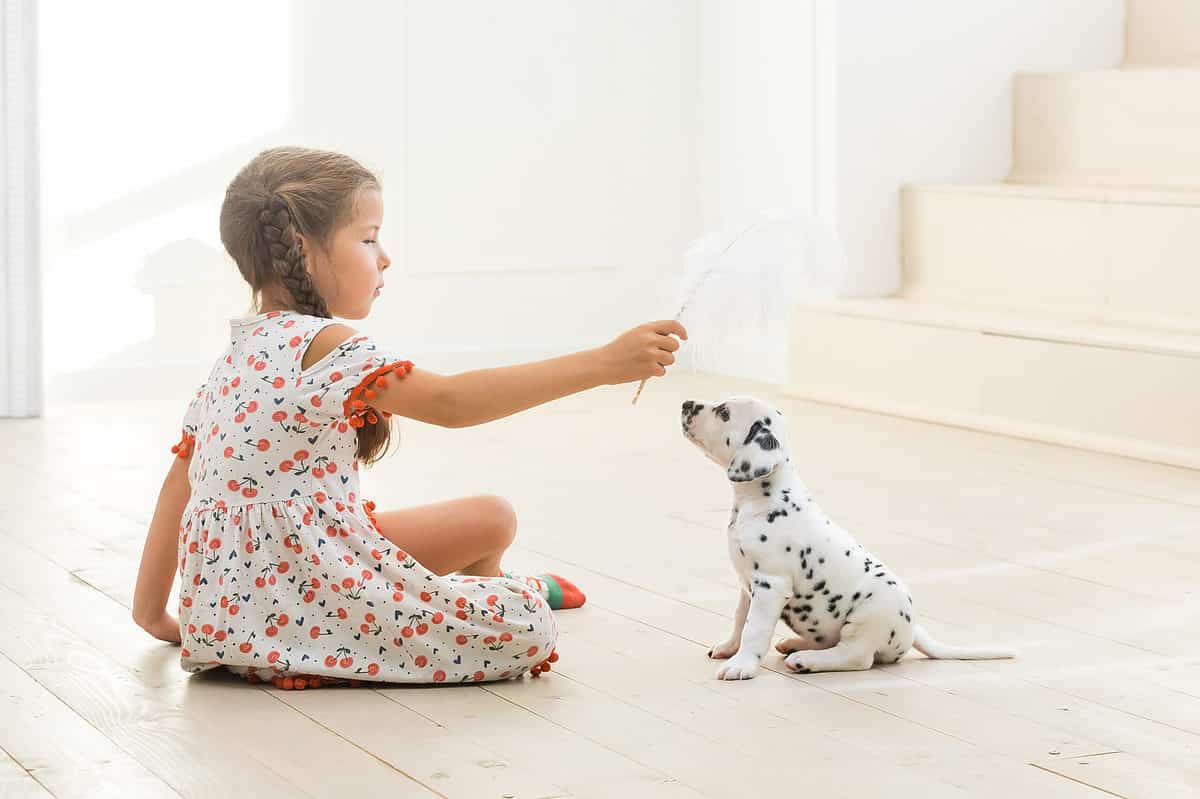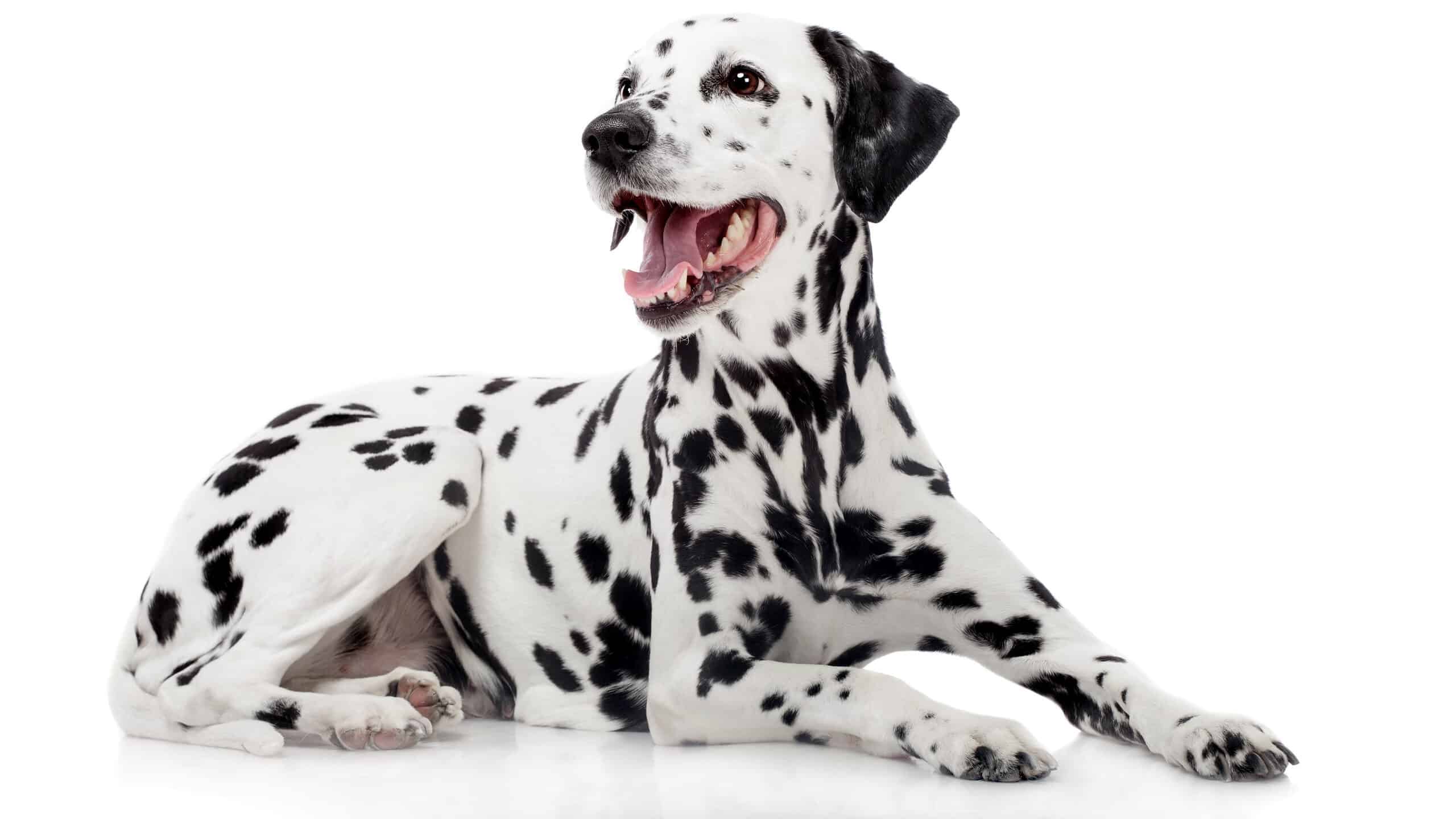A Dalmatian is known for their beautiful coat and affectionate demeanor. When you hear this breed mentioned, it may elicit images of Cruella De Vil and her constant attempt to pursue those gorgeous spots. Maybe, you picture a Dalmatian wearing a fireman's hat as the official firehouse dog. Regardless of what you picture when you hear Dalmatian, the question may remain as a parent, are dalmatians good with kids? If you are a parent thinking about adopting a Dalmatian into your home, you have come to the right place. It is always important to research the breed you are considering. So let's get started.
Key Points of Dalmatians and Kids
- Dalmatians can be sensitive and anxiety-prone dogs. They will most likely require a high level of attention and activities with other humans and dogs.
- Some would Dalmatians to be ‘working' dogs. Giving them various enrichment tasks and a good amount of space is vital for the dog and their energy level.
- Dalmatians are not as patient as other breeds. If your child doesn't have the proper level of respect for the animal, a Dalmatian might snap or otherwise show frustration faster than other breeds.
Dalmatian Personality and Temperament
Dalmatians are beautiful dogs with gorgeous black spots, making them easily recognizable. This breed is very sensitive and energetic. You will enjoy having them as part of your family because of their playful nature and delightful personalities. They love to be around people and to be outside. Their lifespan is 13 years; they can weigh up to 60 pounds and grow to 23 inches tall.
A fun fact about Dalmatians is that they are born without spots! They do not start getting their spots until around two weeks old. Within that time span, it is vital to socialize your spotted pup. As adults they can be aloof or disinterested in other dogs and people they do not know.
What a Dalmatian Needs
Dalmatians are very sensitive dogs, making them prone to high separation anxiety. They love to be around their people. The breed tends to be shy when they don't know someone, so proper socialization is crucial. The more you get your Dalmatian out and around other humans and animals, the easier it will be for them to adapt to various situations. This breed is considered a medium-sized dog. However, they are very energetic and need a lot of space. As a result of their activity needs, they are not ideal for small living spaces or apartments. If you can commit to giving them at least an hour of exercise daily, or more, they may be able to adapt to small living arrangements.
Health Concerns
Dalmatians are prone to a few health concerns. For example, they can be susceptible to deafness. They are also prone to bladder stones and copper storage hepatopathy liver disorders. Let's go into depth about each below.
Deafness causes in a Dalmatian are unknown. Deafness is hereditary and may come from their parents. Breeders can screen for deafness before you adopt your Dalmatian. If your dog is prone to this genetic disorder, some symptoms to look out for are:
- Not coming when its name is called
- Disoriented
- Constantly shaking its head
- Scratching at his ears if there is an infection
Deafness in Dalmatians is not curable. However, there are things you can do to help make it easier for you and your pet. You can learn sign language to teach your Dalmatian. Keep your Dalmatian on a leash while outside, and keep your routine the same. Use big expressions when talking to your Dalmatian, such as clapping and smiling. These are just a few simple steps to ease the transition to complete deafness or cope with deafness at birth with your Dalmatian.
Bladder stones can form and block your Dalmatian urethra, causing pain, blood, and sometimes making them unable to pee. If the total blockage happens, it is an emergency, and your Dalmatian will need to be taken to a vet immediately. The stones need to be cleared away by surgery. You can take specific steps to lower the risk of bladder stones. For example, you can feed your dalmatian a low-protein diet and give them frequent fresh water. Talk to your vet about any other steps that can be taken to prevent bladder stones.
Liver disorders can happen in Dalmatians. These are typically caused by copper storage hepatopathy when the liver stores too much copper. A few symptoms to look out for are lack of energy or depression, orange urine, abdominal problems such as throwing up or constipation, and chronic weight loss. If caught early enough, liver disorders can be treated. The treatment may include supplements, diet changes, antibiotics, or surgery. You will need to talk to your vet about your options if your Dalmatian has this health disorder.
Dalmatians and Allergies
Dalmatians can be prone to skin allergies. Brushing them weekly to maintain their coat and keep skin allergies at bay is a great idea. Keep your eye out for any itching, digging in their paws, and dry skin patches. If any serious skin problems occur or their itching or digging in their paws doesn't stop, please consult your vet about possible reasons or treatments.
Dalmatians are not hypoallergenic. Though they have short coats, they do shed all the time. Therefore, they may not be ideal if you or your child have pet hair or dander allergies. If you or your child requires a more hypoallergenic breed, consider these options.

Dalmatians tend to be a shy breed. They need proper socialization and obedience training to thrive in a family environment.
©Crevous/Shutterstock.com
Cost and Maintenance
Dalmatians are a low-maintenance breed when it comes to grooming. Their dander and shedding can cause allergies, but grooming their coat doesn't take much time. Brushing your dalmatian every week and bathing them regularly can be enough to keep allergies and shedding under control. Cleaning their ears is very important, as well as clipping their nails and brushing their teeth with dog toothpaste; they may be susceptible to gum disease.
Costs to consider before adopting a Dalmatian:
- Adoption costs: $450-$1,200
- Initial vet visits plus regular checkups: $50-$300 or more
- Food: $30-$200 a month, depending on the type
- Vaccinations and other procedures, such as spayed or neutered: $400-$700 or more
- Miscellaneous (food and water bowls, treats, leash, toys, emergency health concerns, etc.) The cost varies
The cost of raising a Dalmatian will vary. Adoption costs depend on several factors, including the breeder's reputation and whether they screen for health conditions. However, these are rough estimates of what each expense may cost.
Training Your Dalmatian
This breed is relatively easy to train. Dalmatians are eager to please their owners and are also very alert. However, they are very sensitive dogs who do not react well to strict training methods. Instead, they respond better to more positive reinforcement, such as plenty of treats and praise from their owners.
Exercising Your Dalmatian
Dalmatians are very high-energy dogs. They love to run and exercise. They should get at least 60 minutes of exercise daily. If you can give them more, that would be great! This breed can be prone to obesity if they do not get proper activity and exercise. The Dalmatian breed is highly intelligent, and as a result, it can become bored and destructive if it is not stimulated.
Some great outside activities to do with your Dalmatians are:
- Running
- Walking
- Chasing balls
- Playing fetch
- Hide and seek
Exercise is necessary for Dalmatians because they are full of energy. Before you adopt a Dalmatian, be sure to consider whether or not you can give them the exercise they need. A family who loves to be outside and is very active will be perfect for a Dalmatian.
Are Dalmatians and Children a Good Match?
Dalmatians can be good with kids. However, their size and excitability may make it easier for them to knock down small children accidentally. Therefore, it is always important to supervise interactions between your child and Dalmatian. Dalmatians are very energetic and love to run. This can be an excellent characteristic when raising Dalmatians and children together. In addition, they love to play with children and spend time with their families.
Dalmatian puppies can be rambunctious and very high-strung. While they are good with kids, they may become irritated more quickly because of their sensitive nature. They also have excellent memories. This means they remember any maltreatment for years to come, even if it was an accident. Their sensitive nature means Dalmatians must be handled with gentleness and respect, like all animals. If you are adopting a Dalmatian, it is important to teach your children to be respectful of them.
Raising Kids Around a Dalmatian
Dalmatians are loyal dogs. They will be committed to their families, including their children. However, Dalmatians need proper obedience and socialization training to thrive in a family with small children. This is because this breed tends to be excitable, sensitive, and shy.
Dalmatians do not bark a lot. Less barking is perfect for families with children who still take naps because they will not typically be disruptive. However, this breed can make excellent watches dogs because they are alert and protective of their families.
Teach Your Child to Respect Your Dalmatian
As with all dogs, teaching your child to respect your Dalmatian is important. Your Dalmatian will likely have a shy demeanor at first; therefore, teach your child respect rules before introducing them to your new pet. Some great rules to have are:
- Do not pull on your Dalmatian's ears, tail, or body. This can irritate or freak a dog out, even if they are a gentle breed.
- Stay out of your pet's face. Even the most patient dog may become annoyed and have a bad day. You never know how they may react.
- Treat your pet as a person, not as a toy.
- Do not bother your pet while eating or playing with a toy. Taking away a toy or food may make them territorial.
- Let babies stay with their momma until they are ready to be separated. Momma dogs can be very protective of their babies.

Dalmatians are high-energy dogs who love to play with children.
©Dikova Maria Russia/Shutterstock.com
Dalmatian History
Dalmatians were once coach dogs in 19th-century Europe. They were used to walking alongside the horses and noble families, and their job was to protect against danger. The name dalmatian comes from the coastal area in Austria called Dalmatia. Dalmatians are thought to be descendants of pointers. Learn more facts about Dalmatians here!
In Conclusion
Are Dalmatians good with kids? They can be! Dalmatians are sweet and affectionate. They are very sensitive dogs who need proper socialization and obedience training to thrive in families. They are highly energetic. A Dalmatian's energy is fantastic because they make excellent playmates for highly active children who love to be outside. They do not constantly bark, making them wonderful watchdogs who are low maintenance. It is important to remember that Dalmatians grow to medium size and can accidentally knock over young children or infants. Dalmatians thrive best in a family that gives them proper exercise and time outside. If you love to be outside, can provide your Dalmatian lots of attention, and supervise the interactions between your children and Dalmatians, they may be an excellent fit for your family!
The image featured at the top of this post is ©Rosa Jay/Shutterstock.com
